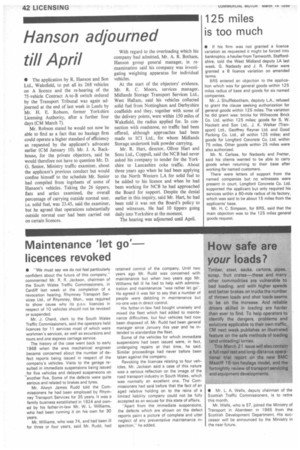Maintenance 'let go' licences revoked
Page 44

If you've noticed an error in this article please click here to report it so we can fix it.
• "We must say we do not feel particularly confident about the future of this company," commented Mr. R. R. Jackson, chairman of the South Wales Traffic Commissioners, in Cardiff last week at the completion of a revocation hearing. Rhymney Transport Services Ltd., of Rhymney, Mon., was required to show cause why its p.s.v. licences in respect of 10 vehicles should not be revoked or suspended.
Mr. J. Chard, clerk to the South Wales Traffic Commissioners, said the operators held licences for 11 services most of which were workmen's services, as well as excursions and tours and one express carriage service.
The history of the case went back to early 1968 when the area mechanical engineer became concerned about the number of defect reports being issued in respect of the company's vehicles. Visits to the garage resulted in immediate suspensions being issued for five vehicles and delayed suspensions on another five. Some of the defects were quite serious and related to brakes and tyres.
Mr. Alwyn James Rudd told the Commissioners he had been employed by Rhymney Transport Services for 35 years. It was a family business established in 1924 and owned by his father-in-law Mr. W. L. Williams, who had been running it on his own for 30 years.
Mr. Williams, who was 74, and had been ill for three or four years, said Mr. Rudd, had
retained control of the company. Until two years ago Mr. Rudd was concerned with maintenance but when two years ago Mr. Williams fell ill he had to help with administration and maintenance was rather let go-. He agreed it was fair to say that a number of people were dabbling in maintenance but no-one was in direct control.
His father-in-law had bought unwisely and mixed the fleet which had added to maintenance difficulties, but four vehicles had now been disposed of. Mr. Rudd had been general manager since January this year and he intended to standardize the fleet.
Some of the vehicles for which immediate suspensions had been issued were, in fact, undergoing repairs at that time, he said. Similar proceedings had never before been taken against the company.
Revoking the licences relating to four vehicles, Mr. Jackson said a case of this nature was a serious reflection on the image of the road transport industry in South Wales, which was normally an excellent one. The Commissioners had said before that the fact of an aged relative holding on to the reins of a limited liability company could not be fully accepted as an excuse for this state of affairs.
"Apart from the immediate suspensions, the defects which are shown on the defect reports paint a picture of complete and utter neglect of any preventative maintenance inspection,he added.
• Mr. L. A. Wells, deputy chairman of the Scottish Traffic Commissioners, is to retire this month.
Mr. Wells, who is 57, joined the Ministry of Transport in Aberdeen in 1965 from the Scottish Development Department, His successor will be announced by the Ministry in the near future.




















































































































